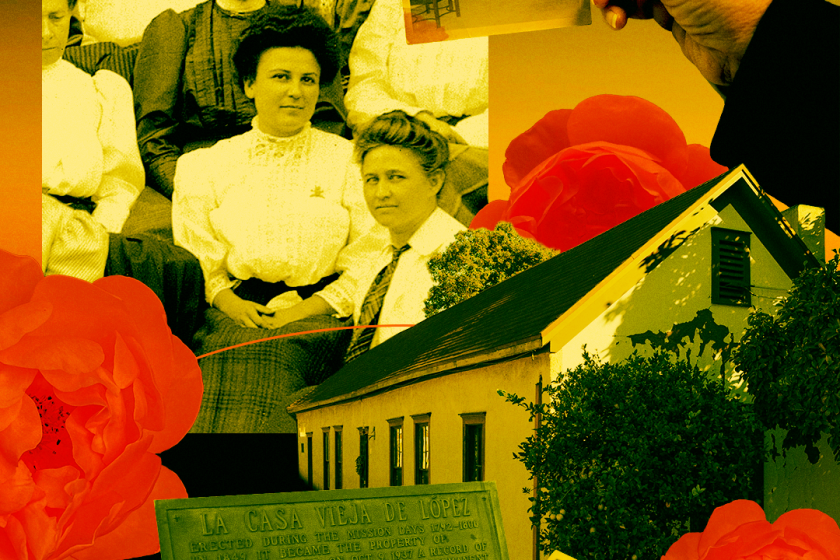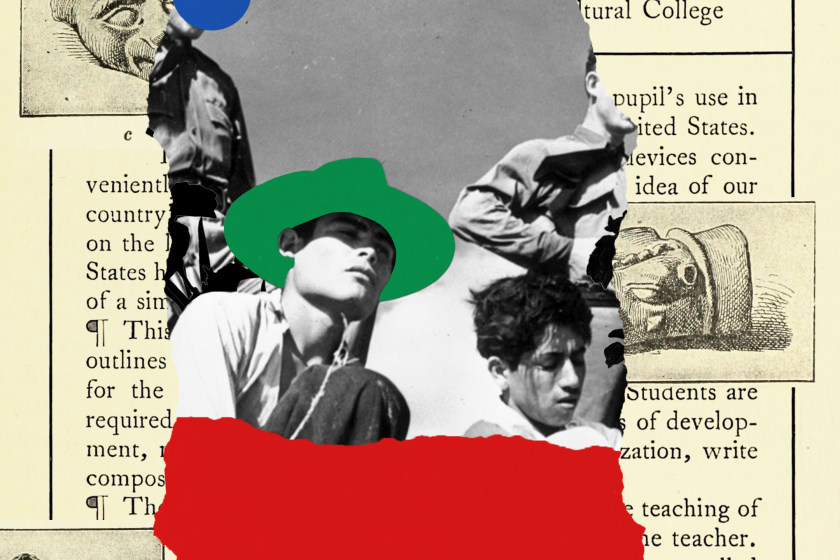
- Share via
Mexican actor Melissa Barrera was credited with revitalizing the “Scream” horror franchise before she was suddenly dropped from her lead role in the upcoming seventh installment. Fans speculated that her firing had something to do with her vocal support for Palestinians on social media, and last week, they were given an answer.
Spyglass Media Group, the production company behind the campy films, said in an official statement to Variety that Barrera had been let go for material posted to her social media that they characterized as antisemitic.
Barrera’s firing is a sad reminder of how historically marginalized groups, like Latinas, are forced to walk a tightrope when advocating for social causes, and of how fragile “representation” is in Hollywood.
According to Variety, Spyglass took issue with Barrera resharing a post accusing Israel of “genocide and ethnic cleansing,” as well as a Jewish Currents article about the distortion of the Holocaust to bolster the Israeli arms industry. It should be mentioned that the article was written by Raz Segal, a respected Israeli historian who has written multiple books about the Holocaust. A cursory glance at his body of work shows his dedication to preserving the memory of the Holocaust. He has, for example, written on Bulgaria whitewashing its role in the atrocity.
Politics are changing in the Rio Grande Valley. Is it the breakdown of machine politics, or gerrymandering? A return to true Mexican family values, or a betrayal of them?
But Barrera wasn’t afforded the luxury of nuance. There was no slap on the wrist. Retribution was swift.
“We have zero tolerance for antisemitism or the incitement of hate in any form, including false references to genocide, ethnic cleansing, Holocaust distortion or anything that flagrantly crosses the line into hate speech,” a Spyglass spokesperson said in the company’s statement to Variety. Again, the Holocaust distortion in question can be attributed to an Israeli scholar.
For her part, Barrera has held her ground, condemning antisemitism while reaffirming her solidarity with Palestinians.
“I will continue to speak out for those that need it most and continue to advocate for peace and safety, for human rights and freedom. Silence is not an option for me,” she wrote on Instagram.
A DACA recipient from a humble background, Ezekiel Pacheco’s story bears a striking resemblance to that of Nico, his character in ‘At the Gates.’
Antisemitism is a real, pernicious evil. I recall the 2018 shooting at the Tree of Life synagogue in Pittsburgh, which is only the visible tip of an issue that’s deeply entrenched in our country. But Barrera being smeared as antisemitic and unceremoniously dropped from a leading movie role highlights a persistent double standard in Hollywood and beyond.
Marginalized individuals, when expressing their support for a cause, must assuage the anxiety of their peers before speaking up. They must promise that they aren’t a threat, must be exceptionally articulate, must cover all their bases, and even when all these conditions are meticulously met, punishment can come anyway.
Their peers, meanwhile, are given the freedom of flagrance: “Stranger Things” star Noah Schnapp posted a video with friends laughing and sharing “Zionism Is Sexy” and “Hamas Is ISIS” stickers. Schnapp has not faced any professional repercussions for making light of the crisis. It was announced Tuesday that he’d been named to the Forbes “30 Under 30” list. Barrera, meanwhile, has been censored for promoting views shared by Israeli intellectuals.
While defending herself, Barrera has referenced her roots, saying that as a Latina and a Mexicana, she feels it’s her responsibility to speak up. I can relate. I remember the helplessness I experienced when watching the Trump administration roll out its “zero-tolerance” border policy that separated hundreds of families in 2017. I remember watching “Abolish ICE” and “kids in cages” become mere catchphrases that more or less died out after Trump left office. I remember how it became far less popular to continue criticizing such practices after Joe Biden took office.
A day after fellow actress Melissa Barrera was fired from her role in the ‘Scream’ movie, Jenna Ortega discloses she won’t be returning either.
The situations are very different, but I experience a similar helplessness today, watching in horror and heartbreak images of dead and dying children being pulled from rubble. Recently, three Palestinian college students, Kinnan Abdalhamid, Tahseen Ali Ahmad and Hisham Awartani, were shot while walking in Burlington, Vt. It’s currently being investigated as a hate crime. Awartani’s mother fears her son may never walk again.
It’s an incredibly human response to speak up in light of such profound suffering, and it saddens me that we are punishing people calling for a ceasefire. Even if one believes Israel’s actions are justified, how can people be expected to stomach such miserable scenes in silence? Especially when, as is the case for both Barrera and myself, these actions are being carried out in our names and on our dime?
It’s worth noting that Barrera’s sentiments roughly reflect U.S. progressives’ shifting views. In 2023, before the brutal Oct. 7 attack, Democrats expressed rising sympathy with Palestinians. But even if this weren’t the case, we must allow for dissent, must allow people to express their concern and their sympathies without fear of being censored or blacklisted. Of course, we should do so without feeding into hateful tropes about historically oppressed groups, but we should also recognize when fear of repercussion is being weaponized to silence people.
I was surprised to see that, within U.S. Latino media, there hasn’t been a greater uproar over the firing of one of our brightest new stars from a popular horror franchise. Especially considering that the lack of Latinas in Hollywood is a glaring issue that has been spoken about at length, including by me.
In 1937, the U.S. Department of the Interior certified that La Casa Vieja de Lopez Adobe in San Gabriel was worthy of preservation for its historic and architectural interest.
As an artist and writer, I have a responsibility, like Barrera, to uplift my community and to reckon with the issues of our day. As Latino creatives in the U.S. who have been blessed with a platform, we cannot simply be an apparatus that only functions to clap like seals when offered scraps of representation and then is silent when it’s snatched away at the slightest provocation.
Barrera’s firing reiterates something we already knew — that representation is conditional and fragile. If we don’t say anything about it, then we fail to do our jobs, fail to adhere to the values we claim to be working toward and abdicate our might.
I understand the fear and the heartbreak that has affected so many of us lately. I’ve watched my Jewish friends take to the streets to call for peace, and have watched my Palestinian friends trying desperately to get in touch with loved ones. It’s been nightmarish, and I say that as someone with a great degree of distance between myself and Gaza, as someone living in relative comfort. But those of us who live in that comfort have an even greater impetus to voice our concerns.
My hope is that we can find a way to move forward with care and solidarity for one another, that we can learn from each other, and that we can extend the grace that every human being deserves when navigating times of crisis and death, the times we live in now.
Latino history in the U.S. is chronically under-covered in schools, according to a report from the Johns Hopkins Institute for Education Policy and UnidosUS, an advocacy organization.
I also hope that we can be brave and that we can speak up when we feel something isn’t right. We might do so imperfectly. I certainly will. For me, Melissa Barrera exhibits that bravery, navigating her advocacy in a way that is firm and kind, willing to listen and clarify, but not budging from her commitment to her values.
I wish Spyglass had given her that same courtesy.
JP Brammer is a columnist, author, illustrator and content creator based in Brooklyn. He is the author of ”Hola Papi: How to Come Out in a Walmart Parking Lot and Other Life Lessons,” based on his successful advice column. He has written for outlets including the Guardian, NBC News and the Washington Post. He writes a weekly column for De Los.
More to Read
The Latinx experience chronicled
Get the Latinx Files newsletter for stories that capture the multitudes within our communities.
You may occasionally receive promotional content from the Los Angeles Times.











